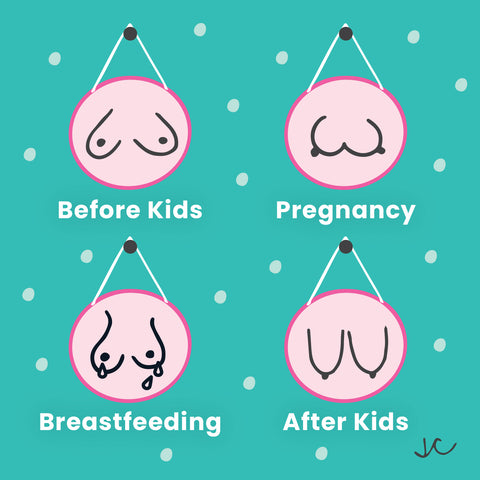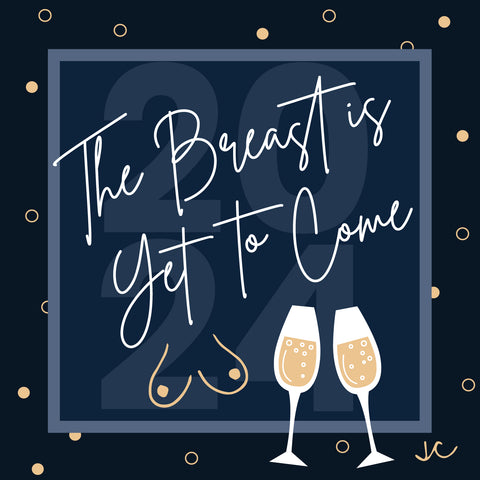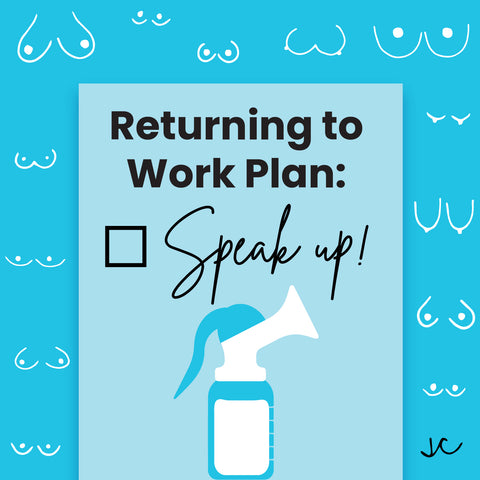The Breast Protection is Early Detection: Hanging with Breast Radiologist and "The Boobie Docs," Robyn Roth, MD

Welcome to Titty Talks!
In this 6-part interview series the founder of Titty City Design, Jessy, connects with real people that are part of #TheBoobment – the social movement we started to break the stigma around BOOBS.
At Titty City Design, we believe that by talking openly and honestly about our experiences with our breasts, we can take back the power from those who over-sexualize our bodies. Instead, we can:
- Promote body positivity, body acceptance, and self-love.
- Help educate and share resources on breastfeeding, making postpartum and transitioning into motherhood feel less lonely.
- And! Encourage each other to take care of our breast health, because 1 in 8 women will be diagnosed with breast cancer in their lifetime.
Get ready to hear from inspiring organizations, entrepreneurs, and healthcare professionals in our brand-new interview series! Join us as we share empowering stories, and learn from passionate entrepreneurs and experts in the field that are helping to break the stigma around boobs and let's keep the conversation going!
Episode 3: Meet Robyn Roth, MD, Breast Radiologist of The Boobie Docs
It's Breast Cancer Awareness Month and we are talking all about breast health and breast screening with The Boobie Docs, herself, Robyn Roth, MD.
As a board-certified Radiologist who specializes in breast imaging and image-guided procedures, Robyn has built her career helping countless women with their breast health. Dr. Roth is also the content creator behind @TheBoobieDocs, a popular social media account on Instagram and TikTok, to help educate others about breast health and breast cancer in an entertaining way.
Dr. Robyn Roth even hosts her own podcast called, "The Girlfriend’s Guide to Breast Cancer, Breast Health, & Beyond" where she talks to top breast cancer experts, thrivers, previvors, and those who love them.
Join Jessy as she Talks Titties with breast cancer expert, Dr. Robyn Roth, to chat about breast health, mammograms, self-advocacy, and detecting breast cancer during pregnancy and breastfeeding, too. Breast cancer is on the rise among young people, and Dr. Roth will be sharing how to advocate for yourself with your doctor and what you need to know about mammograms. Robyn even shares about her upcoming fundraising event, The Boobie Bash, for Breast Cancer Awareness Month! Get ready to learn all about taking breast health into your own hands and being empowered to become your own breast advocate.
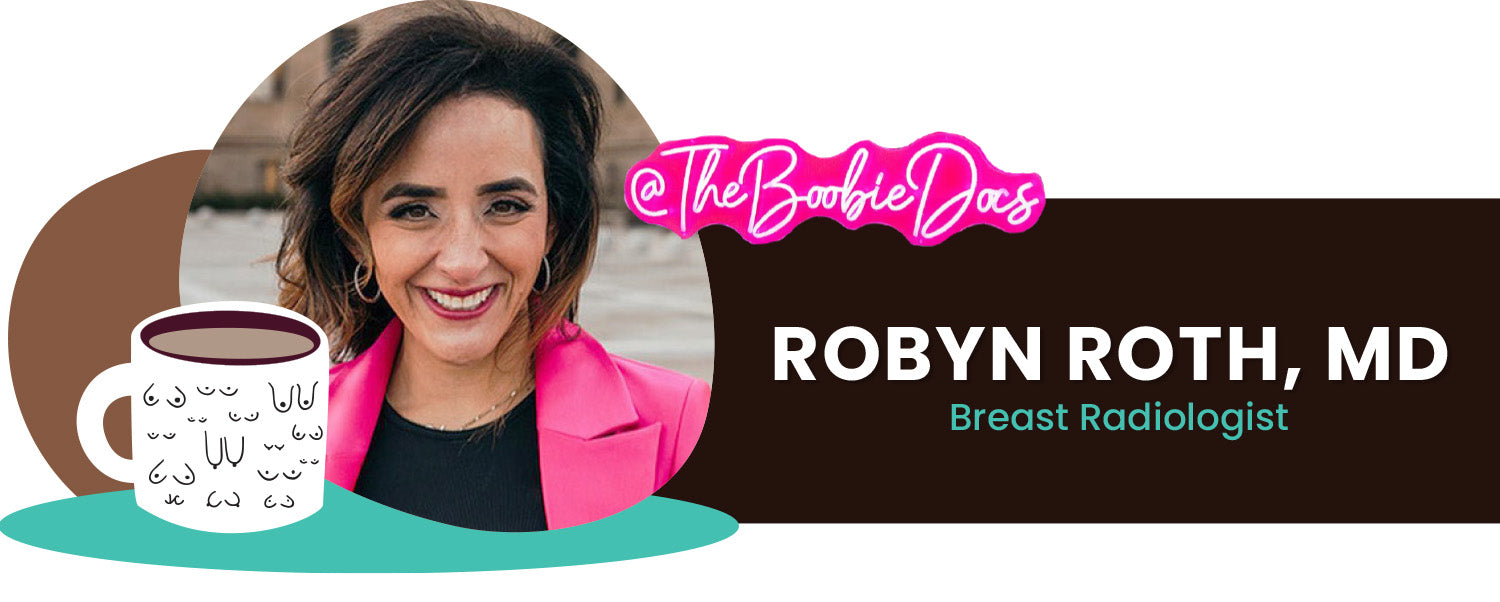
Listen or read our convo below! Enjoy and let us know what you think in the comments!
Listen to Jessy and Robyn
Let's Talk Titties!
Jessy: Thank you for being here. For everyone listening, this is Dr. Robin Roth, and she is also known as The Boobie Docs on Instagram and TikTok. And today we're going to be talking about breast health, advocacy, and a little bit about breastfeeding, too.
Robyn: Yeah. Not only am I a doctor, but I also breastfed three children.
Jessy: That's amazing. It's not easy.
Robyn: That is like one of the hardest things I've ever done was breastfeeding my three children. I did it progressively longer each time. And yeah, that's a struggle in itself. So kudos to any breastfeeding mom. Kudos to any mom, because just being a mom is hard. So however you feed your baby is the best way to feed your baby.
Jessy: I could not agree more. Yes. So thank you for saying that. And, yeah, fun fact about me and Robin is I think we've known each other for just over a year now. I think it was around this time last year, a friend of yours, I believe, saw me at an event and brought home a gift to you all the way from West Coast to East Coast.
Robyn: That's right, my friend Danielle. Shout out to Danielle. We always go boop boop. She found me a pair of socks and was like, I had to get these for you. And I was like, I need more. So then I came to you, and we quickly connected and became Breast friends.
Jessy: We sure did. That's just a little fun fact. I love that we've been in touch through Instagram and text and calls, and it's always fun to connect with you. I love seeing your content and what you're up to.
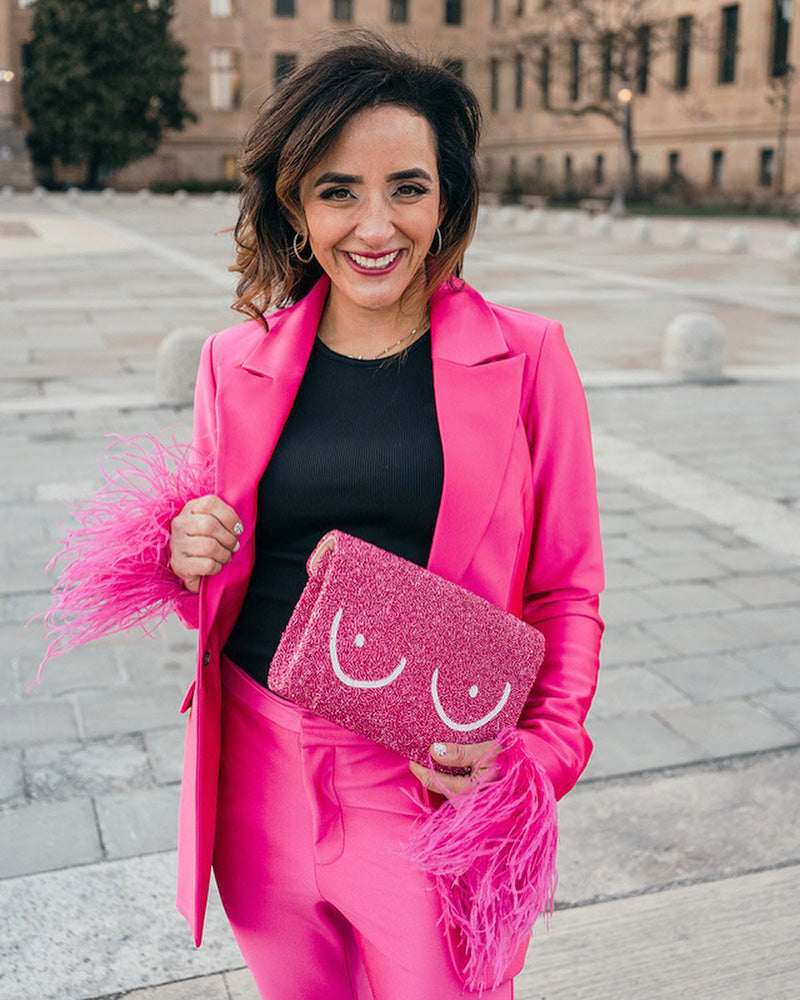
For everyone here, could you tell us about yourself?
Robyn: So. My name is Dr. Robin Roth. I was born and raised in South Florida. I went to the University of Florida for undergrad and then came up to New York for med school. And now I live in southern New Jersey, right outside of Philadelphia. I am a breast radiologist, which means that I am the doctor who would interpret all of your breast imaging, so mammogram, ultrasound, and MRI. I'm also the doctor that would do any biopsies if any of those tests were abnormal and you needed a biopsy.
I'm also the doctor that you would meet if you got called back from any of those tests. And in many cases, unfortunately, I'm the first doctor that someone might meet when they're diagnosed with breast cancer. So it's a really important role that I take very seriously.
And I love just helping all people, mainly women, with their breast health. Aside from being a breast cancer expert, I'm of Ashkenazi Jewish descent, which has an increased risk of carrying a genetic mutation and also a family history of BRCA. I always say, I'm a 40-something Ashkenazi Jewish woman with a strong family history of breast cancer and genetic mutations.
So I'm a consumer of my own content. I started the Booby Docs a few years ago. It's kind of evolved over time. I started it because I was really looking well. I used to love writing. I missed being creative. I think a lot of people going through med school and then having kids.
Somewhere along the way, I lost my passions, which was writing. And I always used to say I wanted to start a blog, but I didn't know what the blog was going to be about. Like, am I a doctor am I a mom? What am I? Kind of that existential crisis that a lot of people I probably face when they're having in the childbearing years. And that's when it occurred to me that I think it was actually one late night when I was breastfeeding my son in the middle of the night. So I originally started an Instagram called,@DrRobynRoth. I know, genius. And I did nothing with it. And then like, one late night when I was breastfeeding my son during the COVID pandemic, I was like, I'm surrounded by breast all day. Like, I'm surrounded by boobies ALL day.
And I texted my best friend, who actually is a colleague of mine, we work together. She's my best friend from day one of med school. And I was like, I'm changing the name to @TheBoobieDocs. It's going to be both of us, and we're going to be talking about being moms and being breast friends and breast health. And it's just kind of evolved over time.
It's become a way of life. I mean, it's my entire identity right now, as you can see, just because I realize how passionate I am about the cause and how there really is this lack of communication, direct communication between doctors and patients.
Social media is the wave of health information of the future, right? Like, we know that up to 25% of people get their health information from social media, particularly with breast cancer. There's lots of misinformation out there, as you know. So I become more passionate about this than ever.
I lost my best friend along the way, meaning she doesn't do the social media aspect anymore. But I kept the S because I love collaborating with other individuals like you. And I say I have multiple personalities. Like I wear a doctor hat, I wear a mom hat. So for me, the s just kind of makes sense.
Jessy: I love that. I love that. So great. It's so great that you have this platform. I love watching your videos and they are really informative. And, you're right. I go to Instagram to get a lot of information myself, whether it's health-related or not. I was on there when I became a mom, looking for information about motherhood and what to do with my newborn. And so it's definitely a place where people go. The fact that you're on there and sharing real information and also in a way that is quick and fun and it's a heavy topic, but you bring your personality, “TheBoobieDocs” personality to it, and you really do feel like someone's breast friend that's right there to give you the information.
Robyn: My whole goal has always been to educate and empower people to be their own breast advocate.
The statistics are kind of startling. We know that cancer is on the rise in young people. It's increasing at about 2% per year, and specifically, the highest rate of increase was in breast cancer in 30- to 39-year-old women.
Robyn: My whole goal has always been to educate and empower people to be their own breast advocate.
The statistics are kind of startling. We know that cancer is on the rise in young people. It's increasing at about 2% per year, and specifically, the highest rate of increase was in breast cancer in 30- to 39-year-old women.
Jessy: Wow.
Robyn: It was 17% over a ten-year period, which is alarming. So something's going on. It's probably not one thing, but multiple things. I think that lots of the research right now is trying to identify who these people are that are increased. Like, why are these people developing breast cancer? What are we doing wrong? I don't think we're going to identify one root cause – if you cut this one thing out, then you won't get breast cancer. It's multifactorial. It's complex. And there are lots of things like environmental factors that are out of your control.
This is where empowering you to know what breast cancer screening protocols are right for you and ways that you could find your breast cancer early, because that's ultimately what we're left with. If we can't figure out who is getting these breast cancers, then we need to find it early. And that's really one of the key points of my platform.
Jessy: Yeah, I've heard your phrase: “Early detection is the breast protection.”
Robyn: Yes, I should have that needle pointed.
Jessy: It's so great because you're right, breast health is super important and just like you said, the age is coming down. It's not anymore. Like, oh, I'm too young. Let's talk about that a little bit.
What do you want younger people to know about when it comes to breast health? What are the risks? What should you be doing? What should you be looking out for? When's the time to seek medical attention?
Robyn: I mean, there's so much we could talk about, right? So, the age ranges that I talked about are not included in the general standard screening recommendations for average risk people, right? So, like, breast cancer mammogram guidelines, 40 every year in average risk, women save the most lives.
Okay, so “average risk” is a key word. We're trying to identify people that are at increased risk for developing breast cancer, should start breast cancer screening earlier and do supplemental imaging.

So a good rule of thumb we say, [get screened] ten years before a first-degree relative that was diagnosed with breast cancer, but not before age 25 for MRI and age 30 for mammography.
Okay, so let's say that your mom was diagnosed with breast cancer at age 35. We would start doing MRI at age 25, and starting at age 30, we would add an annual mammogram onto that as well. We kind of usually stack them every six months.
So in January you're getting a mammogram, and then in six months later you're getting an MRI. So you're never going longer than six months without having some kind of breast cancer screening.
And then there are newer recommendations out there saying that all women should have a breast cancer risk assessment before age 30 with their doctor.
So having a real conversation about family history of breast cancer. Do you have any genetic mutations in the family that you know of? Multiple family members that have cancers going back to the first three relative? It's a very high-risk factor, having the first three relatives, but even stronger if they have pre-menopausal breast cancer. So, before the age of 50, all these things go into play. All these things increase your risk.
Another one doesn't apply to most people, but it does apply to plenty, which is having chest wall radiation for, let's say, lymphoma. We had a teenager this week come into our clinic for breast cancer, and it turned out that she had some kind of tumor when she was a child that had radiation to the abdomen. But when you're talking about a small baby, right, like, radiation gets to other parts of the body. So these are the things that we're looking for. These are the people who need to start breast cancer screening earlier and refer to a genetic counselor.
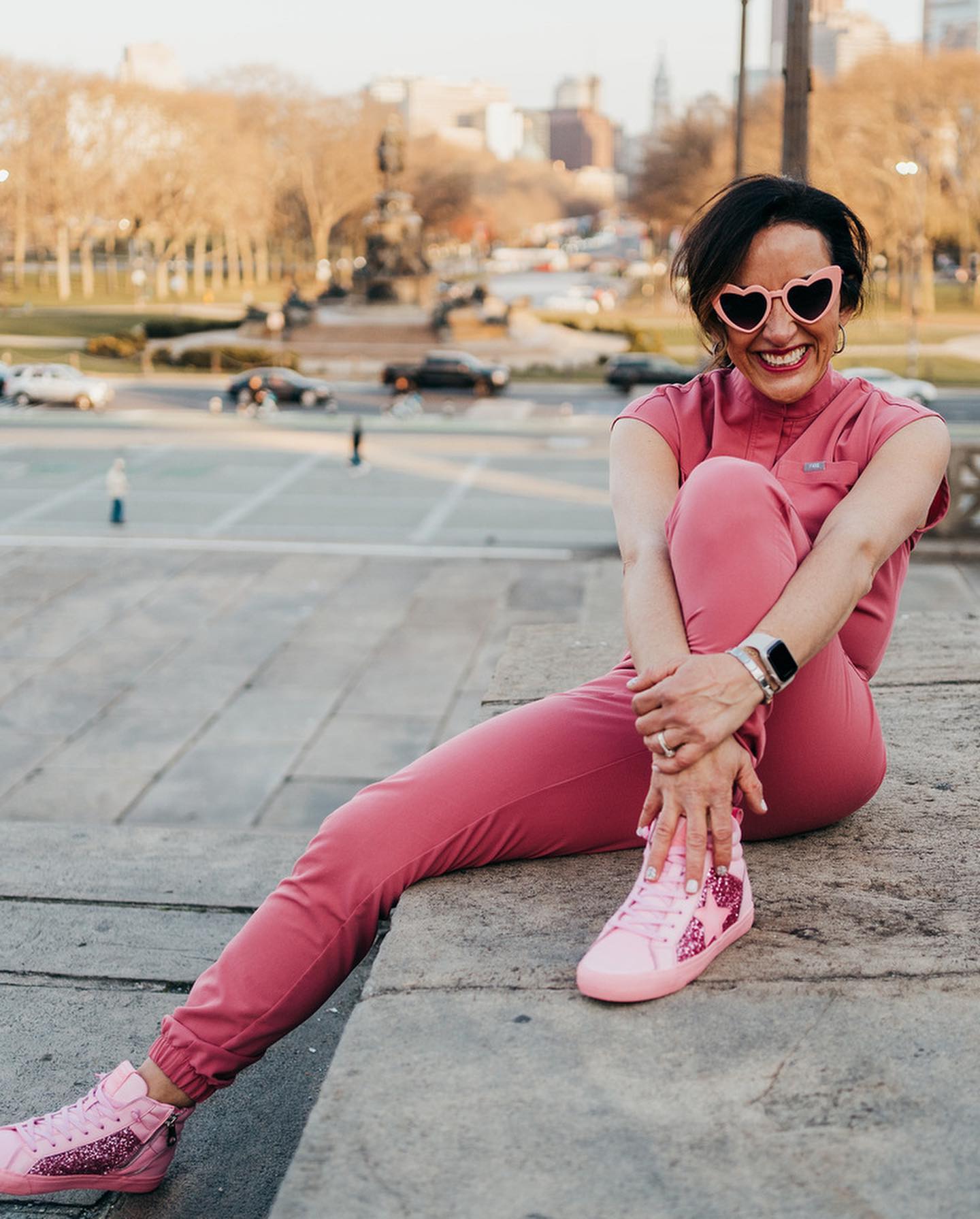
When should these types of conversations be taking place with your doctor and what doctor do you talk to? Your OBGYN?
Jessy: Should these conversations be happening at your annual appointment? Because I know, like myself, it's something that I don't always feel like my doctor has brought up to me, but more that I've come to my appointment and brought it up to my doctor because there's a history of breast cancer in my family, and it was also diagnosed at a really young age. It was me who came forward to my doctor years ago and was like, hey, this is my history and what's my plan?
Robyn: So here's the thing about breast health is that there's no one doctor that is your breast health doctor, right? People falsely assume that their OBGYN is taking care of it, but really they're focusing on down there [menstrual health]. So they're not trained on breast health. They're not up to date on the latest recommendations for breast cancer screening guidelines and dense breast tissue and who needs to see genetic counselors. So it's not their fault.
It's like the healthcare fault, like the healthcare system's fault. We have this problem where it's like a lot of people use, especially when they're in their 20s, are using their OBGYN as their primary care doctor. And that's really not the role of the OBGYN.
They're probably the one who will do a clinical breast exam every few years. So by default, they're probably in charge of your breast health. And it's unfair to them because, like I said, they're not trained. I actually have been trying to work with residency programs, trying to incorporate at least, like, a two-week elective of breast cancer screening, like what we even do. What does a mammogram look like? What is a biopsy? These are the kinds of things that they just don't know. It's a problem.
Jessy: I never thought about that because I did kind of assume that my OBGYN was in charge of my breast health, too. I have a primary care doctor now, but I in my 20s, I only saw an OBGYN. It just made sense to me at the time. And just thought that, that was also taking care of the rest of my health.
Robyn: I think it really emphasizes the point that we have to be our own breast advocates, right? They might not be up to date on the latest literature and recommendations from the Society of Breast Imaging, like a radiologist is, but you're not going to meet me until there's a problem. So there's the disconnect, right?
So that's why also my platform is so important to educate people and even doctors. I have a lot of healthcare professionals that follow me and they're like, I did not know this. This is not something that we learn in medical school. There's a systemic problem here as well. But again, going to the advocacy portion.
I really am a strong supporter of the monthly self-breast exam. And this is even controversial, right? Because let's just talk about the self-breast exam. So the self-breast exam is when you check your breast at least once a month, ideally around five to seven days after your menstrual period, but honestly, do it at least once a month. I like to say, “Feel it on the First,” because also, like you, I love alliteration and it's just easy to remember. I always do a cute post about it and then I use my little handy breast health model from Nerdbugs, which I love.
And basically, you're just looking at your breasts for any changes, skin dimpling, rashes, there's more symptoms that breast cancer can present as than lumps, right? Especially if a breastfeeding patient, which we'll talk about.
So looking for subtle changes like looking your breast in the mirror and then actually physically touching your breast using circular motions. And ideally this is done laying down or with your arms above your head or in the shower. But again, it's just about doing it every few weeks just to make sure that everything is unchanged.
People a lot of times will say my breasts are lumpy. Well, that's how your breast feels when they stop being lumpy. Or there's a start to have you start to have a lump that feels different or harder getting bigger. These are the symptoms that we should not be ignoring. Breast swelling is a common one or redness to your breast.
These symptoms may be mastitis [if you are breastfeeding], but if it doesn't resolve, then we also have to be worried about breast cancer.
I always tell people, if you find an abnormality, if you find a change, pay attention to it over the next few days.
But in the meantime, start making a doctor's appointment and by that time it might be resolved, right? And then we probably know it's nothing to worry about. But I always encourage people if they do a physical exam, just make sure that they're taking your complaint seriously and they don't just say you're too young to get breast cancer and it's just a clogged duct.
I always encourage patients to say, how do you know that it's not anything more serious? Is there any kind of imaging test that we can do to make sure that it's not breast cancer? I know it's rare, but I'm just wanting to rule this out.
Jessy: Yeah, you want to rule it out.
Robyn: Yeah, exactly. So taking that next step of what can we do to make sure this is not breast cancer is a conversation that I think we need to start having with our providers, challenging them a little bit. And if they don't know the answer, then maybe they refer you a breast specialist, which there are breast surgeons, nurse practitioners, there's lots of breast specialists.
We just want to make sure that we're not just ignoring or dismissing symptoms without appropriately evaluating them.
Jessy: Right.
Robyn: We know that's called medical gaslighting. It's a thing especially in young women, especially in pregnant patients, especially in breastfeeding patients, where it's most likely going to be a clogged duct. But again, it could be breast cancer. So, we want to make sure we rule that out.
Jessy: Yeah. And also I hear that another really good thing to do with your self-breast exams is to just really take note and just know what your body does look like, really examine to know what your body looks like. So that way you're more attuned to something that is different versus like, I can't remember, was that really there before? Or something like that. So there's a consistency factor of checking.
Robyn: Exactly. And if you choose the same time each month, I think that's also important part because a few days after your menstrual cycle, it might be very lumpy and tender. So maybe that's not the greatest time to do it, but as long as you choose a time and be consistent about it and just set a monthly reminder or “Feel it on the First,” and there are plenty of us who will kind of shove this message down your throat [on social media].
About 80% of young people find their own breast cancers themselves. This is especially important in the population that we're not screening with routine mammograms and things like that. So we know there's an increase in young breast cancers, and we just have to be vigilant.
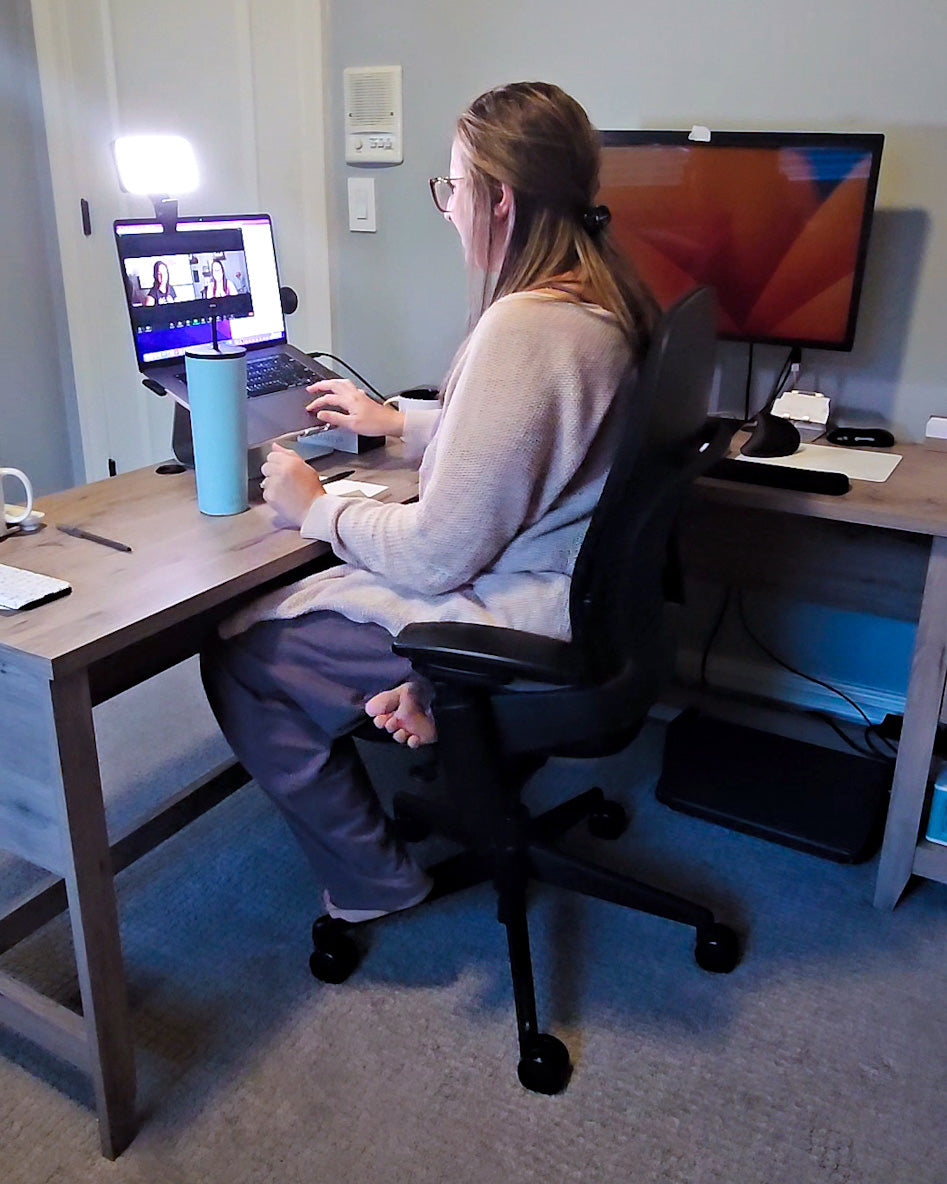
So let’s talk about the breast cancer screening age for mammograms starting at age 40. Why hasn’t the age for mammograms and other breast cancer screenings moved down to age 30 or even earlier?
Robyn: It's a constant battle. I mean, we have the American Cancer Society not recommending self-breast exams, but they recommend breast self-awareness. So it's like what is the difference? To me, it's gotten very political.
At the end of the day, we just have to be vigilant, especially with these increasing rates of young breast cancer.You're your own breast advocate. Oftentimes you're the first one to find the abnormality or your partner finds it or just something feels off. You just have to trust your body, listen to your body.
Jessy: That's all really good information, especially about being your best advocate. That's just like pretty much across the line.
Robyn: Right.
Jessy: Anywhere, any health-related issue, especially since there's not anybody that's trying to make sure that you are in the best health. That's got to be you. That's got to be yourself.
Robyn: Right.
Jessy: We definitely need to encourage others to be their own best and breast advocate.
Robyn: Yeah, totally.
I also want to point out that also when you're doing a self-breast exam, make sure you're including the clavicle in your armpits because your breast tissue can go out that far.
Jessy: Yes. I've even heard that it goes out that far. And you can even have breast milk coming out from your armpit.
Robyn: Yeah, you can. Again, if you feel a lump, it could just be normal hormonal breast tissue. But again, it's usually very easy to tell on imaging whether it's something that needs to be worried about or biopsied. So just from the radiologist perspective, we usually start with an ultrasound under the age of 30. And starting at age 30, we do a mammogram and an ultrasound if you have an area of concern.
And sometimes even if imaging is negative, but it's very suspicious based on you physically, it's getting larger. We might even send you to a breast surgeon to biopsy it. So breast imaging definitely plays a role, an important role, and also just a clinical level suspicion is important too.
Jessy: Yeah. Wow. I mean, ever since I started Titty City Design, there have been so many really cool things that have come out of it. So many connections and building a really cool, what I call, communi-Titty
Robyn: Oh, I like that. Yeah.
Jessy: Again, get a little pun in there. In this communi-Titty, people feel more comfortable reaching out and I love it because I've started to gather different resources, you included, that I can help direct other people to.
But what has been kind of alarming to me is that since starting this, I've gotten DMs from people in their 20s and 30s that found out they have breast cancer. And it has been blowing my mind and it definitely made me hyper-aware and made sure that I was on top of my own self-advocacy and breast health and wanted to be able to use my platform to help encourage others as well.
I've heard this from several people, and two people that had reached out to me, one being somebody that I went to high school with who found out during their breastfeeding journey that they had breast cancer, like you mentioned before.
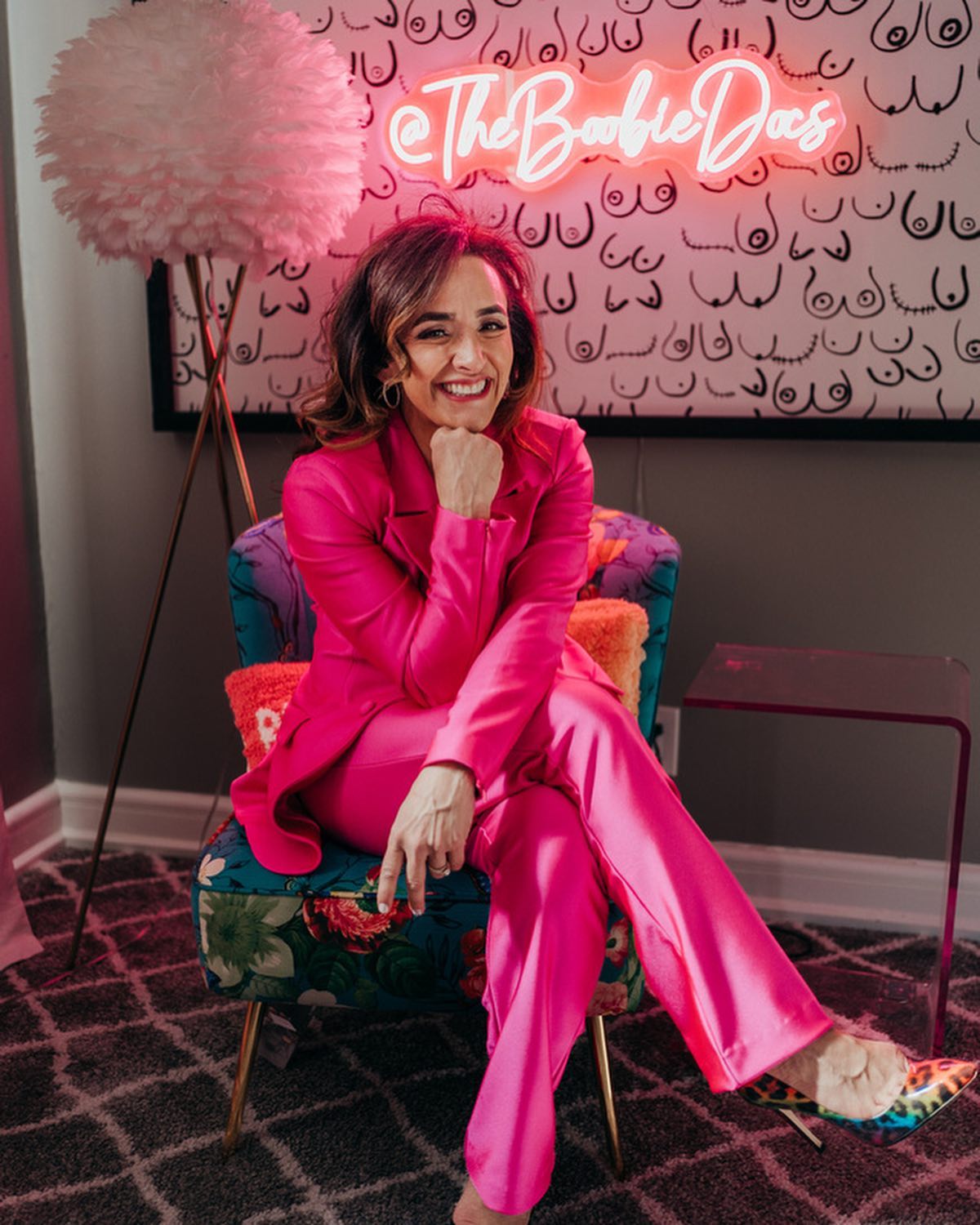
Is finding breast cancer while breastfeeding something that is common? Can you talk about that a little bit?
Robyn: I would love to talk about that. Yeah. Breast cancer, unfortunately, is the most common cancer during pregnancy and the postpartum period. So pregnancy associated breast cancer is when you're pregnant or the year postpartum.
There is a rise in pregnancy-associated breast cancer. It's associated with increasing maternal age. So as mothers' ages get older, we're seeing slightly higher rates of pregnancy-associated breast cancer, unfortunately. And they typically are diagnosed at a later stage.
They usually have worse outcomes. It's not that they have more aggressive tumors, they usually have delayed diagnosis. So it can be hard.
People are hesitant. I think a lot of doctors tiptoe around pregnant patients, right? They don't want to hurt the baby, they don't want to hurt the mom. But I think we have to take these breast complaints seriously. So it can be very confusing, right, in a pregnant or breastfeeding patient, because your breasts undergo a lot of hormonal changes that are normal and there's lots of benign things that pregnant women can develop and most of the breast changes that pregnant women will feel are benign. But it's out there.
There is an increased rate [of breast cancer] during pregnancy in breastfeeding. This goes back to advocating for yourself. If something feels off, if the baby just suddenly stopped latching from one side, that's actually a sign that something could be going on in the breast.
So pay attention to those types of things. All those things are important. And again, don't be afraid to ask for imaging.

Are there signs in your breast milk that you can see that may present itself as breast cancer?
Robyn: No, nothing that you could see. But I think on the cellular level, the baby might be able to sense something going on, which is kind of cool if you think about it. Yeah, it's like a protective measure for the baby, right? Like they sense that something's going on.
Does a breast cancer diagnosis mean you should stop breastfeeding. Will the milk harm the baby?
Robyn: Well, there's no harm, I don't believe. But when we have a diagnosis of breast cancer, we have to start treatment. I actually just had a recent podcast episode with my friend. Her name is Dr. Elise Cardonic. She runs an Instagram called, Cancer and Pregnancy. She is currently battling rectal cancer, but she specifically deals with cancer during the pregnant and postpartum period. And sorry, what was the original question?
Jessy: If you should stop breastfeeding or is there harm?
Robyn: No, there's no harm to the baby, but you have to prioritize the mom's health with minimizing damage to the baby. So if there is a diagnosis of breast cancer during pregnancy or in the postpartum period, they take into account your gestational age, they might change the approach of how they treat it based on if you're pregnant or not, whether they might do surgery versus before chemotherapy. The thing they want to try to avoid is also having premature labor.
So all these things come into play. So there are special sorry that's getting a little off topic, but meaning breast cancer during pregnancy can be treated. Pregnancy during postpartum period, during the breastfeeding period is a little bit better, but it might preclude you from breastfeeding your baby if they're going to start doing surgery or chemotherapy or things like that. So that's really where it comes into play.
Jessy: Got it. Okay.
Robyn: I know you had asked me about imaging during pregnancy and breastfeeding, so I want to just talk about that for a moment.
Does a breast cancer diagnosis mean you should stop breastfeeding. Will the milk harm the baby?
Robyn: Well, there's no harm, I don't believe. But when we have a diagnosis of breast cancer, we have to start treatment. I actually just had a recent podcast episode with my friend. Her name is Dr. Elise Cardonic. She runs an Instagram called, Cancer and Pregnancy. She is currently battling rectal cancer, but she specifically deals with cancer during the pregnant and postpartum period. And sorry, what was the original question?
Is it safe to do breast imaging if you are currently pregnant or breastfeeding?
Robyn: In the pregnant patient, you actually can do mammograms safely. Ideally, we'd like to wait till the second or third trimester. So if you're due, you can get a mammogram. The radiation dose of the fetus is extremely low, especially because there are several layers, there's the placenta, there's amniotic fluid, so it's very minimal.
I mean, you could always put a lead shield on if you're really worried about it. Ultrasound has no radiation, so that is something that we could definitely do during pregnancy. Obviously, in many cases, we'll start with an ultrasound and do a mammogram if it's age-appropriate. We cannot do MRI during breastfeeding. That's not true.
You cannot do MRI during pregnant while you're pregnant because the gadolinium, the dye will cross over to the baby. So we can't do that, but we can do a mammogram and ultrasound during the pregnancy. When you're pregnant, during to the breastfeeding and the postpartum period, you can do all breast imaging. You can do a mammogram, ultrasound, and MRI. Your breasts are going to look more dense and more active in all these studies.
So for mammogram, we usually tell people to feed the baby right before or pump and store the milk. There's no need to empty everything out. There's no need to pump and dump. After a mammogram and ultrasound with MRI, you might want to maybe dispose of one round of milk after your MRI, but it is something that you can have while you're breastfeeding.
Jessy: Okay.
Robyn: Your breast will look more hormonally active, meaning we're going to see a lot more background enhancement or normal breast tissue enhancing, which can make it a little bit harder to read the MRI, but we can usually work around that. Okay, that's a helpful break.
Jessy: Really helpful. These are the kinds of things that a lot of people just don't know. Not to mention when you are pregnant and when you are postpartum, you're already tapped out on what you are able to process, and you're exhausted physically, emotionally, all of the things. And so it's nice to have some information or just like some basic knowledge, so you're aware before you're going to have to do something.
Robyn: It's helpful information.
It's helpful for you to know this information because your doctor might not even know this information. Right. They might say, you can't get a mammogram, you're pregnant. You could say, that's not true. The dose is extremely low and use this as a resource.
Jessy: Well, and it's so true. I mean, I remember when I was pregnant. People just don't want to touch you.
Robyn: Yeah. They're scared.
Jessy: Everybody's scared of what can happen and don't want to be anything responsible for something happening during your pregnancy.
Robyn: Totally.
Jessy: That makes sense too. And you can't neglect your own health and all that at the same time. So there's definitely this balance and being able to be aware with your own knowledge so that you come to those conversations and can help guide them versus waiting to hear it, especially when you're in that state, like I said, like pregnant or postpartum, you're dealing with a lot of other stresses at that time.
So during pregnancy and postpartum you have an increased risk of breast cancer, but I thought that these periods are also helpful to protect against breast cancer. Can you explain?
Robyn: Yeah, that's true. I will also tell you, though, that pregnancy and breastfeeding are protective things. They will lower your risk of developing breast cancer over your lifetime. So even though breast cancer is the most common during pregnancy in the postpartum oddly enough, it also is a protective thing, those things that doesn't really make sense.
Jessy: Yeah, a health protective. Yeah, I heard that a lot too. Does it matter, like, the length in which you breastfeed to offer the best health protections?
Robyn: The longer you breastfeed, the better the protection, yeah. The longer you do it, there is more significant benefit over six months.
And the longer you do it, the more protective it's like kind of a protective state when the estrogen is a little bit low and the progesterone is a little high and that's where it comes from.
Jessy: Okay, that's good to know.
Robyn: Yes. But yes, by breastfeeding, you are doing your baby and yourself some good.
Jessy: That's amazing.
Robyn: Yeah.
Jessy: Well, thank you for talking all about breastfeeding and breast cancer and screening and all that. And I also wanted to just talk about mammograms in general.
So pregnant or not, breastfeeding or not, what do we need to know about mammograms? I know there are lots of myths out there. Like that, it hurts. How long does it take? What's it like? Can you share your experience?
Robyn: I mean, I have a few great reels [on Instagram] from when I got my first and second mammogram, so I highly recommend watching those, but it really is not as bad as people make it out to be.
It's going to be a little painful. I could always tell people, if you want to minimize the pain, try to schedule it again day seven to ten of your menstrual cycle. And also you can maybe take an advil an hour before to minimize the tenderness. But I had one, I thought it was like, I'd say, a five out of ten. I know that some people find it extremely painful. I think it depends on the person and the technologist that's performing the exam.
But going with an open mind, right. It's not comfortable, but it gets the job done.
When you're going for your mammogram appointment, you want to make sure that you're not wearing any deodorants or creams around the breast area because often that can show up on a mammogram and look like calcifications.
You always want to bring any prior [breast images] if you've had any, because comparisons are extremely helpful. So if you maybe had an ultrasound when you were 18 years old, try to find those. If it's in the last five to ten years, they can be very helpful.
Jessy: Okay.
Robyn: Especially when we're trying to determine stability. The technologist essentially takes two different pictures of each breast. They squeeze it like this. They squeeze it from above. This is called the CC view. And then they kind of squish it at an oblique view.
Typically, if you have implants, there's an extra set of images we take where we kind of push the implant out of you to get those images. And really, the mammogram itself takes under 5-10 minutes. Most places you leave, if it's a screening exam, meaning you're just coming in for your annual screening checkup, you have no complaints.
Usually get it, and your doctor gets the results in three business days, and you get them within 30 business days with a letter. If you have something called the Diagnostic Study, when you're coming for, like you're coming because you have a complaint that's a little bit different, you're going to get the mammogram if you're over age 30 or the ultrasound under age 30. And then if it's a lump, we always typically do an ultrasound after that. And at the end of that appointment, then the radiologist will usually give you the results that day.
Whether it's nothing to worry about, it's just tissue, or if it's probably benign, which is the category a lot of people fall into that's. When we're saying it's less than 2% chance of that being cancer, we typically follow those patients for a little bit at short intervals. Or if it's something that needs to be biopsied. And even when we do a biopsy, when we're recommending a biopsy, most of them are going to be benign. If you get a BI-RAD 4, which is a category, that means we see something that's suspicious and we need to do a biopsy, about 80% of those will be benign.
So even if you do need a biopsy, most likely it will benign unless you get something called a BI-RAD 5, which is like a highly suspicious finding. The radiologist that's interpreting the imaging is pretty certain that this is cancer, and they're going to biopsy it, see it, but also if it comes back benign, they're going to say, I don't buy it, and it needs to get evaluated further by a surgeon.

About 10% of people get called back from their mammogram, just to give you some numbers. So if 100 people come in for a mammogram. Ten of them will be called back from their mammogram saying something's abnormal. We need to do additional testing.
Of those ten people that called back, six of them will be told it's nothing, it's benign, it's negative, nothing to worry about. Two of those people will be told it's probably benign. Like I said, that's that short interval category, two of those people will end up needing biopsies out of the original 100. It was two women will need a biopsy just to kind of give you the numbers of what to expect.
Jessy: Okay.
Robyn: So even if you get called back again, it's too early to start freaking out. I always say, like, 60% of the people that called back will be told it's nothing to worry about and you're good.
Jessy: Yeah, but that wait time is probably pretty uncomfortable.
Robyn: Exactly. I mean, the anxiety is real. Or the “Scan-xiety” that one feels when waiting for the results of an imaging test, it's real.
Jessy: Yeah, absolutely.
Robyn: But at the end of the day, knowledge is power.
We know that early breast cancer detection leads to better outcomes, less morbidity and mortality, and just overall less aggressive treatments means you're going to get back to work quicker and you're going to maybe have less arm swelling, things like that. Those are all the things we have to consider.
Jessy: Yeah. Wow. Well, this was all really helpful information, and I really appreciate you taking the time and getting really detailed about it because a lot of times we just kind of just know a little bit. But I think you went in and gave some really good a bit deeper of a dive into it, so I really appreciate that and I think everybody that's listening to Will as well. I'm going to make sure that this is Live for Breast Cancer Awareness Month, which is October, and you're going to be hearing a lot from docs during that time already.
Robyn: But all good things are coming up.
Jessy: Yeah. Well, tell us a little bit about that.
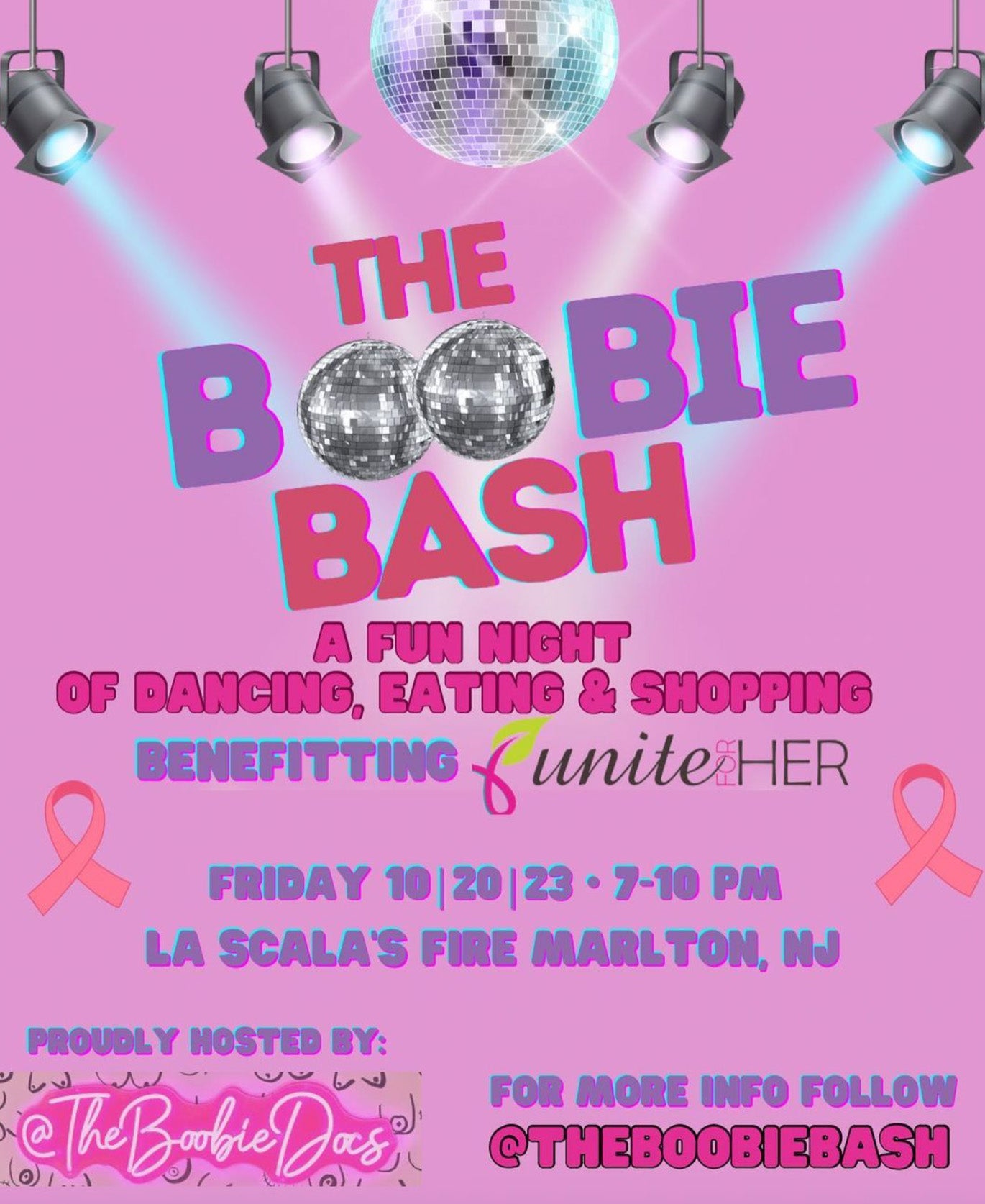
What's coming up for you? I know, little whispers of something like a Boobie Bash.
Robyn: Yeah. So I'm having my first ever fundraising event called the Boobie Bash. If you're in South Jersey, Friday, October 20, come! It's going to be the most fun party ever. I've been wanting to do this for about two years, and it's finally happening. All the proceeds are going to an amazing breast cancer organization in Philly called, Unite for Her. I highly recommend checking them out.
Jessy: Go ahead and send me all that information. I'll make sure I include it with this episode and share on social media as well.
Robyn: A night of positivity. Actually, the theme is Barbie, so it's going to be like, Boobieland. This is Boobieland.
Jessy: Oh, my gosh. Wow. I can't wait to see all the TikTok content and Instagram content. Oh, that's amazing.
Robyn: And I also have some really exciting upcoming news appearances, so hopefully I'm not going to jinx anything, but some exciting things coming down the pipeline. So follow @TheBoobieDocs to keep up with all the fun things that I'm up to this month.
Jessy: Yeah, that's awesome. I love getting to see your segments. You're featured all over the place, and it's amazing. So I'm so glad that we are Breast Friends and that we, too, found each other. I think that was just so meant to be. It's so cool how that did we.
Robyn: Just become breast friends?
Jessy: Breast friends, exactly.
Robyn: I also want to say for those who are looking to take a deeper dive into more breast cancer-related content, I have a podcast myself called, The Girlfriend's Guide to Breast Cancer, Breast Health and beyond. So hopefully we're going to be releasing this on both because I think this is such an important conversation about breastfeeding, but certainly, I have a bunch of episodes about I say it's designed to help anyone who's navigating a breast cancer diagnosis personally or a loved one that has a loved one that's navigating.
Jessy: Amazing. And I'll make sure to share that information as well. And yes, this content will be available on both platforms.
Robyn: Thank you so much.
Jessy: I'm so happy we got to make this happen, so thank you.
Robyn: Me too.
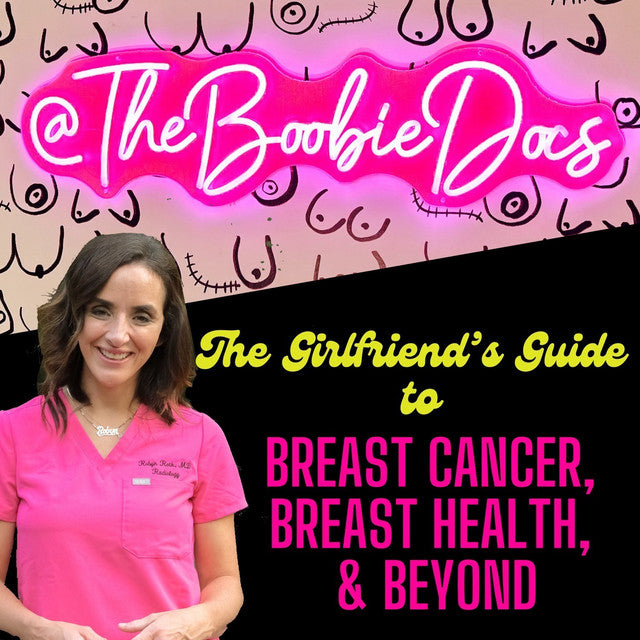
The Boobie Docs on Instagram: https://instagram.com/theboobiedocs
The Boobie Docs on TikTok: https://tiktok.com/@theboobiedocs
The Boobie Docs Podcast: https://podcasts.apple.com/us/podcast/the-boobie-docs-the-girlfriends-guide-to-breast/id1586884287
The Boobie Bash Fundraiser | @TheBoobieBash: Get Tickets
Friday, October, 20, 2023 from 7:00 - 10:00 pm
at La Scala's Fire in Marlton, New Jersey
Stay tuned for more Titty Talks
Join Jessy for the next Titty Talk in our 6-part interview series where we feature another incredible woman that is a part of "The Boobment," our social movement to break the stigma around BOOBS.
At Titty City Design, we believe that talking openly and honestly about our experiences with our breasts is key to promoting body positivity, body acceptance, and self-love. That's why we're thrilled to launch our Titty Talks interview series, where we're speaking with inspiring brands, organizations, entrepreneurs, lactation consultants, and healthcare professionals who are passionate about supporting moms and promoting breast health.
By sharing their stories and expertise, we hope to educate and empower new moms, make postpartum and the transition into motherhood feel less lonely, and encourage each other to take care of our breast health. Join us for our next Titty Talk interview, and let's keep the conversation going!
At Titty City Design, we believe that every boobie is beautiful, and that should be celebrated. We are a female-owned and operated, small business here to spread self-love and body positivity with our line of boob apparel, boob accessories, and boob-themed decor and products for the home. A portion of our proceeds goes to help support postpartum people and breast cancer patients.
Breast Cancer Patient Products





